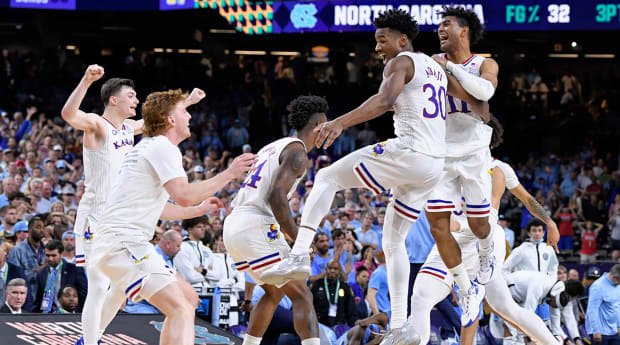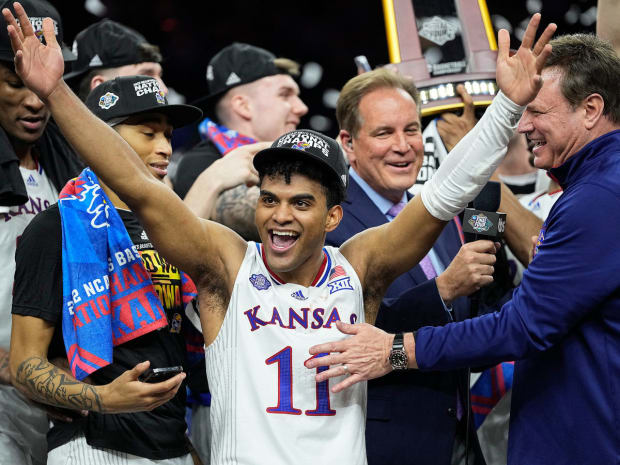Kansas looked dead in the water.
The excitement of a quick 7–0 lead had rapidly faded to despair for the Jayhawks fans in the Superdome in New Orleans. KU had no momentum and was losing by more at halftime (15) than any team to ever win the national championship. The Jayhawks were in foul trouble, missing layups and couldn’t keep North Carolina off the offensive glass.
What could Bill Self say in the locker room?
The Hall of Fame coach harkened back to Kansas’s last national championship in 2008 to ask his team a question.
“Which would be harder, being down nine with two minutes left or being down 15 with 20?”

Greg Nelson/Sports Illustrated
Of course, the former scenario was what the Jayhawks faced in 2008, when Mario Chalmers rescued KU against Memphis in one of the most thrilling championships in tournament history. While there was no epic shot or defining play like Chalmers’s in this one, Kansas had dug itself a hole that would require a nearly-perfect finish to climb out of. And while KU wasn’t quite perfect in that second half, the Jayhawks used a remarkable 31–10 run in its first 10 minutes to pull off a remarkable comeback, then made more plays down the stretch than a Tar Heels team that wouldn’t go away to win their first national championship in 14 years.
Facing its halftime deficit, the Kansas locker room had at least one confident player in it—senior big man David McCormack, who sat smiling as the team tried to regroup.
“He was telling me, like, keep your head up, keep going, we'll be all right. I was, like, man, I don't know if I've ever been here before,” junior guard Christian Braun said. “Down 15 in a national championship game, I definitely never been there.”
But KU came out of the locker room looking like it had been there before, and it all started on the defensive end. Self has a saying he has used for years about “making the other team play worse.” The gist is simple: Even if you’re not making shots, you can still win a game by making your opponent play worse than you. During that 31–10 run, Kansas did just that, using relentless defensive ball pressure to disrupt a North Carolina offense that looked far too comfortable in the first half. It was a similar recipe to what the Jayhawks had done coming out of halftime against Miami in the Elite Eight, when KU rallied from a 35–29 deficit before proceeding to blow out the Hurricanes in the second half, conceding just 15 points over the final 20 minutes.
“Coach always says, you're gonna win still if you make them play worse than you. That's just a defensive mentality that a lot of teams say they have, but Coach Self kind of forces that on you. And I think this team has developed that,” Braun said Friday. “Miami in the second half, that's what we did. We weren't making shots, we still really didn't, but we made them play worse than us in the second half.”
It was the defensive pressure that allowed Kansas to keep charging even as All-American wing Ochai Agbaji missed four consecutive free throws in the midst of Kansas’s run to take the lead. After turning it over just five times in the whole first half, UNC matched that number in the first 10 minutes of the second, miscues that helped get Kansas out in transition for easy buckets. The catalyst in that run? Defensive specialist Dajuan Harris Jr., who served as a major disruptor against RJ Davis and Caleb Love in the Carolina backcourt.
“It was Dajuan, he sparked it in the second half,” Agbaji said. “His defensive pressure rubbed off on everyone else and that's where we got that momentum from on the defensive end and everything else fell in place on the offense.”
There was also the Remy Martin factor. Martin has said he always wanted to go to Kansas, but was only a Jayhawk because of the extra year afforded to all players who participated last year in the midst of the COVID-19 pandemic. His marriage with Bill Self was supposed to give KU the jolt it so desperately needed from a talent standpoint, but instead seemed to create more headaches than solutions. Martin was brought off the bench in the team’s exhibition game in November, struggled at times with turnovers and poor shot selection, then was sidelined with a persistent knee injury for a significant stretch in Big 12 play. And in Monday’s title game, Martin came off the bench and took five shots in his first five minutes of action, missing four of them while North Carolina made its push.

David J. Phillip/AP
So how did he end up front and center next to Self as the Jayhawks were presented with the national championship trophy? With a second half for the ages that proved what an x-factor Martin was. He made all four shots he took in the second half, including all three of his threes. All of those triples came while the game was tied—one that gave KU its first lead since the first half, one that ended a Carolina spurt after a late-four point lead by Kansas had dissipated and one that broke a 65–all tie with under three minutes to play.
“I just came in there, tried to make something happen and shot the shots with confidence,” Martin said.
The 2019–20 iteration of the Jayhawks was clearly the nation’s best team before the NCAA tournament was canceled. The ’20–21 version, at least per KenPom, was the worst of the Self era. Kansas did still earn a No. 3 seed last year, but the Jayhawks looked far from a team headed for a national championship and got blown by 34 in the second round of the tournament against USC. Self clearly agreed: In the press conference after that drubbing, the coach said that for KU to contend for a championship next year, it needed to get more athletic, longer and bigger.
Flash-forward and the Jayhawks are the last team standing, with all five starters in the title game having been significant contributors on last year’s team. Martin added a level of dynamism they may have lacked a season ago (as the nation saw Monday), but for the most part, these are the same Jayhawks. In an offseason that had all-time highs in roster turnover, Kansas won, more than anything, because of internal improvement. Agbaji grew from a steady wing into a consistent 20 ppg scorer. McCormack improved his body, had the biggest game of his career in the Final Four and scored two defining buckets down the title game’s stretch. Braun grew into a legitimate Robin to Agbaji’s Batman and expanded his game from shooter to scorer.
“After the [2020–21] season we took like one week off, and we got right back to it and started going for like an hour a day, workouts and working out. Everybody that returned just got better,” Harris said Sunday. “I feel like when we came back, it was our goal to make it back here. I don’t think anyone that’s here had won anything, so we wanted to set a legacy.”
The legacy has been set. The 2021–22 Jayhawks are the kings of men’s college basketball, even if it took a comeback for the ages to pull it off.

.png?w=600)





